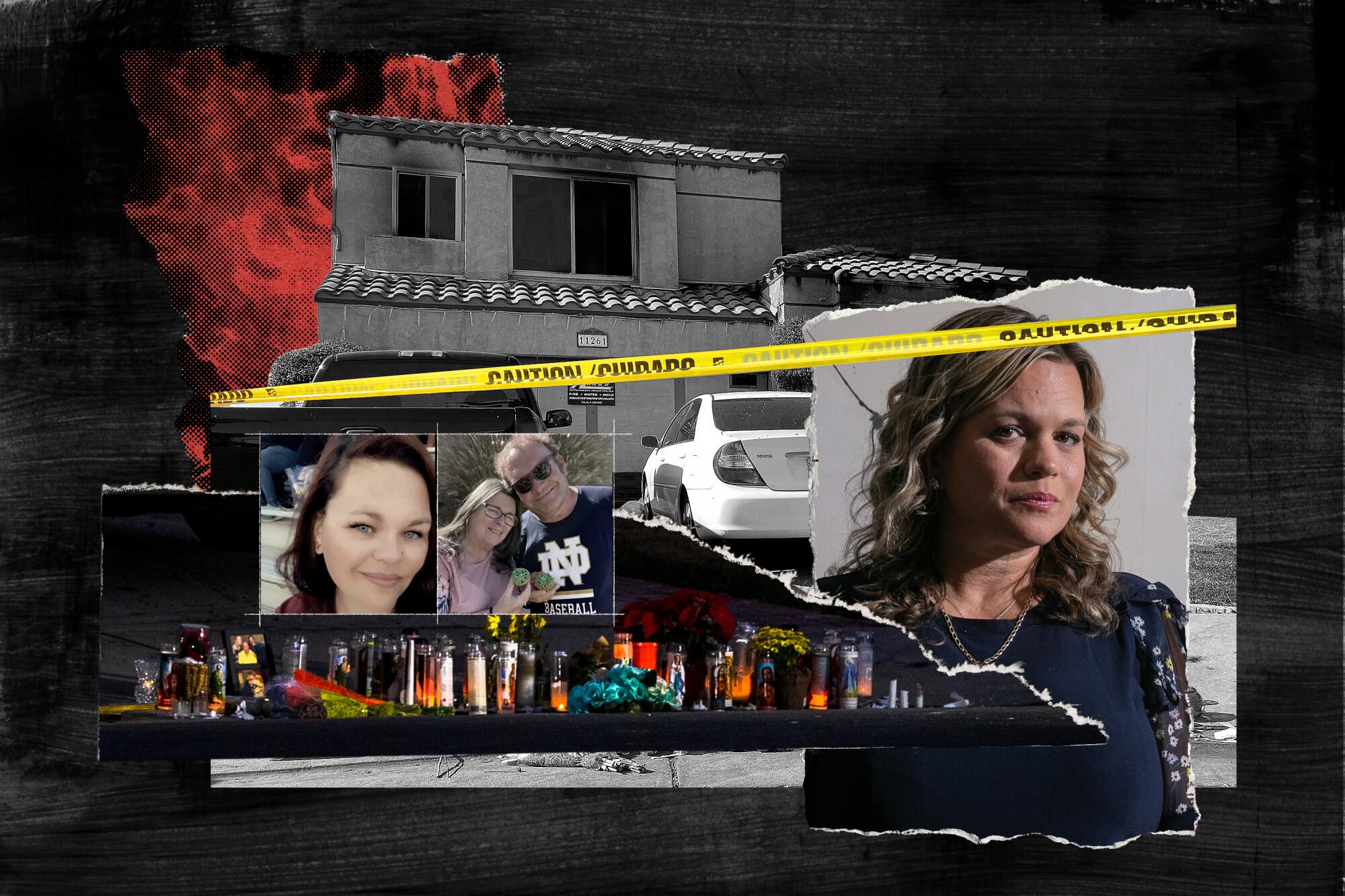
- Share via
Mychelle Blandin was getting ready to buy Christmas lights when her mother called in a panic. She was speaking too fast for Blandin to understand. Blandin asked her mother to take a breath and start again.
In a shaky voice, Sharie Winek explained that a detective had shown up at her home in Riverside. He needed to speak to Sharie’s 15-year-old granddaughter. It was urgent.
His request was odd. It was around 9 a.m. the day after Thanksgiving. Why did the detective need to speak with them immediately?
Sharie and Mark Winek lived on a quiet cul-de-sac, Price Court, with their daughter, Brooke Winek, and her two girls.
When the detective arrived that Friday, Brooke and her daughters were already out. He said he needed to question the 15-year-old about something that had happened at her school. He told Sharie that if the younger girl came home, he’d have to interview her as well.
To avoid that, Sharie asked Blandin if the younger girl could get dropped off at her house while the detective did his work. Blandin agreed.
Sharie also told Blandin that Brooke needed to bring both her daughters’ cellphones with her. The 15-year-old, the detective said, should stay in the car until he was done questioning the adults.
Once her younger niece arrived, Blandin called her mother to say Brooke and the 15-year-old were on their way to Price Court.
Again, her mom’s voice was trembling and her words ran together. Once more, Blandin told her mother to take a breath and start over.
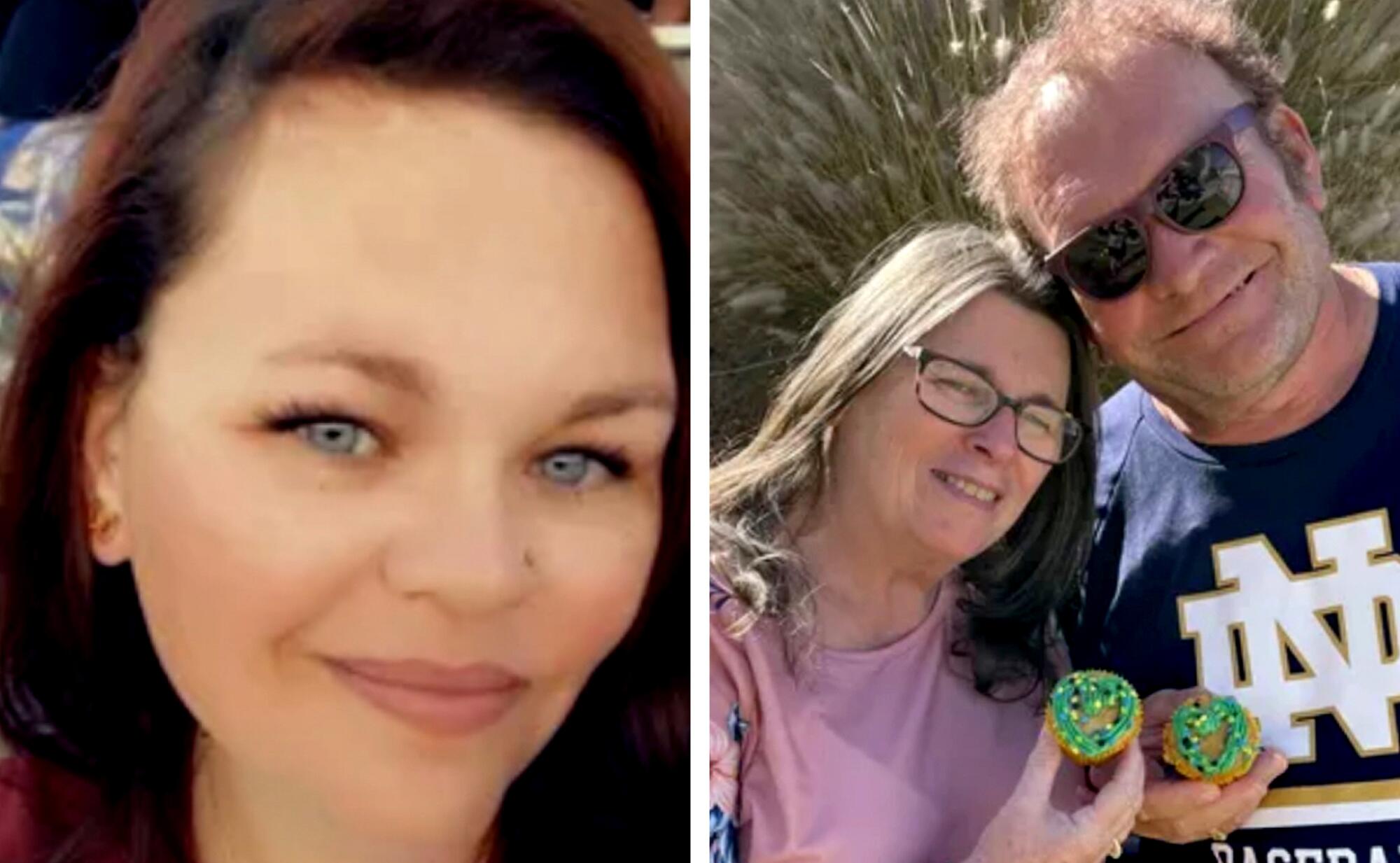
The detective, she told Blandin, had pictures of the inside of the house.
She didn’t want him to take the teen away.
The detective took the phone from Blandin’s mother and placed it to his ear.
“I’m here with your mom,” he said. “She is kind of being anxious and freaking out.”
“My mother wants to be cooperative.”
“Everything is going to be OK,” he said. “Everything is going to be OK.”
He handed the phone back to Blandin’s mom.
In the background, Blandin heard the detective say that he needed to see the teen’s room. The man also asked to see the room decked out in Green Bay Packers memorabilia.
How did he know what the upstairs bedroom looked like?
Blandin pressed her ear into the phone.
“I’ll call you back,” Blandin’s mother said. “I’ll call you back.”
The call ended.
The detective must have shown his badge to get inside, Blandin reasoned. Her mother didn’t like to open the door for strangers.
Blandin went shopping for Christmas lights. She texted her mom from the store to ask how the investigation was going.
No response.
Blandin expected silence — her mother was probably busy talking to the detective.

Subscribers get exclusive access to this story
We’re offering L.A. Times subscribers special access to our best journalism. Thank you for your support.
Explore more Subscriber Exclusive content.
Hours before he showed up at the Wineks’ door, the man had already visited Price Court.
Around 6:58 a.m., he had parked his car at the other end of the street, then walked toward the Winek house, a tan two-story decorated with Christmas lights. He was tall and wore a blue medical mask and a tan trench coat. A black fedora covered most of his brown hair. He was carrying a black duffel bag.
The man had walked down the middle of Price Court and paused near the Winek home, then returned to his car.
He did this at least twice until, eventually, the man got into his Kia and drove off.
Around 9 a.m., he returned and parked in someone’s driveway down the street. He made his way to the home once more, but this time, he approached the door.
Blandin was still shopping when one of her parents’ neighbors saw a man walking down Price Court in a tan trench coat and black fedora. He was carrying a plastic bag and a black duffel. Blandin’s 15-year-old niece was with him.
This must be the guy who parked his red Kia Soul in my driveway, the neighbor thought. She had already called Riverside police’s non-emergency line to report the car’s license plate number. She was on the phone with her husband when she opened her garage door to confront the man.
“You can’t park here,” the neighbor said.

“I’m sorry,” he said. “Sorry.”
She watched the man open the back passenger side door and position the 15-year-old inside. He then went around to the back door on the driver’s side and placed the plastic bag and black duffel inside the car.
The neighbor thought the teen was trying to mouth something to her but couldn’t decipher the words. Before the man closed the car door, she heard the girl faintly say “help me.”
About an inch of the man’s trench coat was open, and the Wineks’ neighbor saw a splotch of red on his white shirt. Could that be blood?
“The driver came out,” the woman told her husband on the phone. “I already called the cops.”
The man looked straight at her. He got into the car and sped out of her driveway.
The neighbor called Riverside police again. She told them the driver of the car she reported earlier had come back.
“There’s a girl with him who might need help,” she said.
Sign up for This Evening's Big Stories
Catch up on the day with the 7 biggest L.A. Times stories in your inbox every weekday evening.
You may occasionally receive promotional content from the Los Angeles Times.
Around the same time the red Kia peeled out of Price Court, Blandin looked down at her phone and saw a Facebook message from her parents’ next-door neighbor and close friend, Bonnie Davis.
“Please call me ASAP,” Davis wrote.
Blandin called. The Price Court house was on fire, Davis told her. She needed to get over there right now.
Blandin abandoned her shopping cart and bolted with her husband, Ben, to drop the kids off at a relative’s home. The couple made their way to Price Court.
She started calling her parents and her sister. They didn’t answer their phones. She had a feeling something was terribly wrong.
She messaged Davis.
“I NEED TO KNOW THEY ALL ARE OK,” Blandin wrote. “There was a detective there this morning. Are they home? Where are their cars?”
Davis didn’t respond. Blandin’s husband drove faster.
Blandin called Davis again.
“Where are their cars?” Blandin asked.
Davis told Blandin that her parents’ and Brooke’s cars were in front of the house.
“I screamed their names,” Davis said. “No one responded.”
The call ended.
On Price Court, Davis watched as firetrucks arrived and neighbors trickled out onto the street.
Davis’ son was outside. He saw first responders pull three bodies out of Blandin’s parents’ home. Davis’ son told his mom to look away.
By the time Blandin reached Price Court, police cars, firetrucks and ambulances already flooded the street.
Before her husband stopped the truck, Blandin threw the door open and started running.
Yellow police tape blocked her path to her parents’ house. She couldn’t see the home and officers would not let her through.
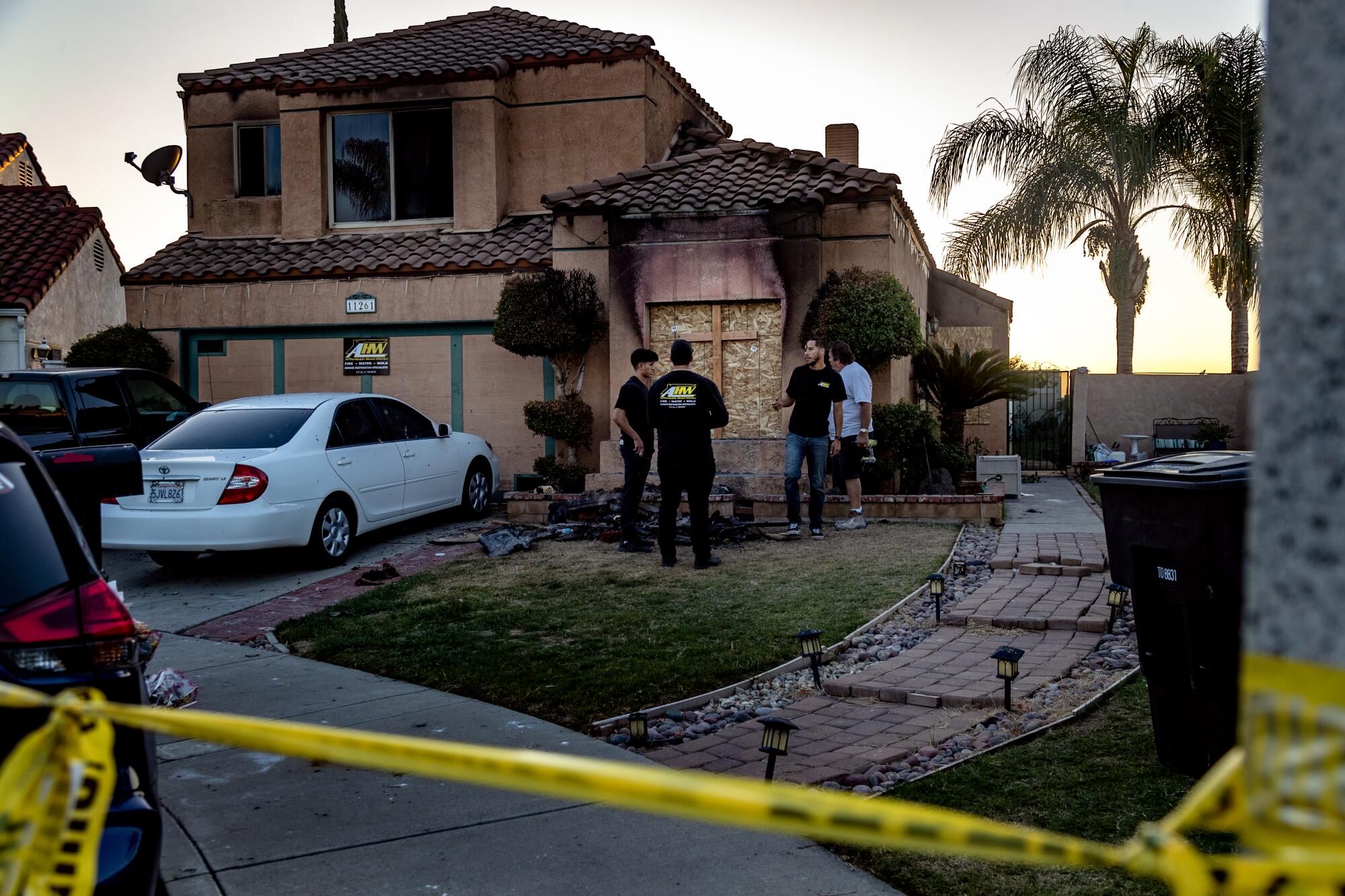
Where was her family? Were they all inside the house?
Blandin locked eyes with Davis, who was standing behind the yellow tape near other neighbors. Davis offered her an air hug.
After police verified that Blandin was related to the Wineks, they asked if she could come to the station to answer some questions.
At the station, officers asked Blandin about who was at the Price Court house that morning and what happened. She told them about the phone calls and asked them where her parents and sister were.
The police also asked Blandin whether she had asked the detective to identify himself. She told them she didn’t because she assumed her mother had already done so before she let him inside.
Around 3:30 p.m., Riverside police told her that her niece had been abducted.
Blandin started crying. Until that moment, she had believed her niece was inside the house and possibly died in the fire. She was scared she might never see the 15-year-old again. But she was grateful the girl was alive.
A few hours later, the police informed Blandin they’d rescued her niece. They gave her permission to return to what remained of her parents’ house.
Around 11 p.m., Blandin returned to Price Court.
Scorch marks ran up the front of the house that she and Brooke had watched transform from a dirt lot into their childhood home. Several windows, including the one in her sister’s bedroom on the first floor, had been blown out by the fire. Her family’s charred possessions were piled on the front lawn. Her mother’s white Toyota in the driveway was coated in soot.
Outside the house, police asked Blandin if her father had any markings on his body.
Blandin told them he had two tattoos — a Green Bay Packers logo on his left arm and a Notre Dame mascot on the right.
Police confirmed that her parents and sister had all been killed.
Blandin collapsed on the street.
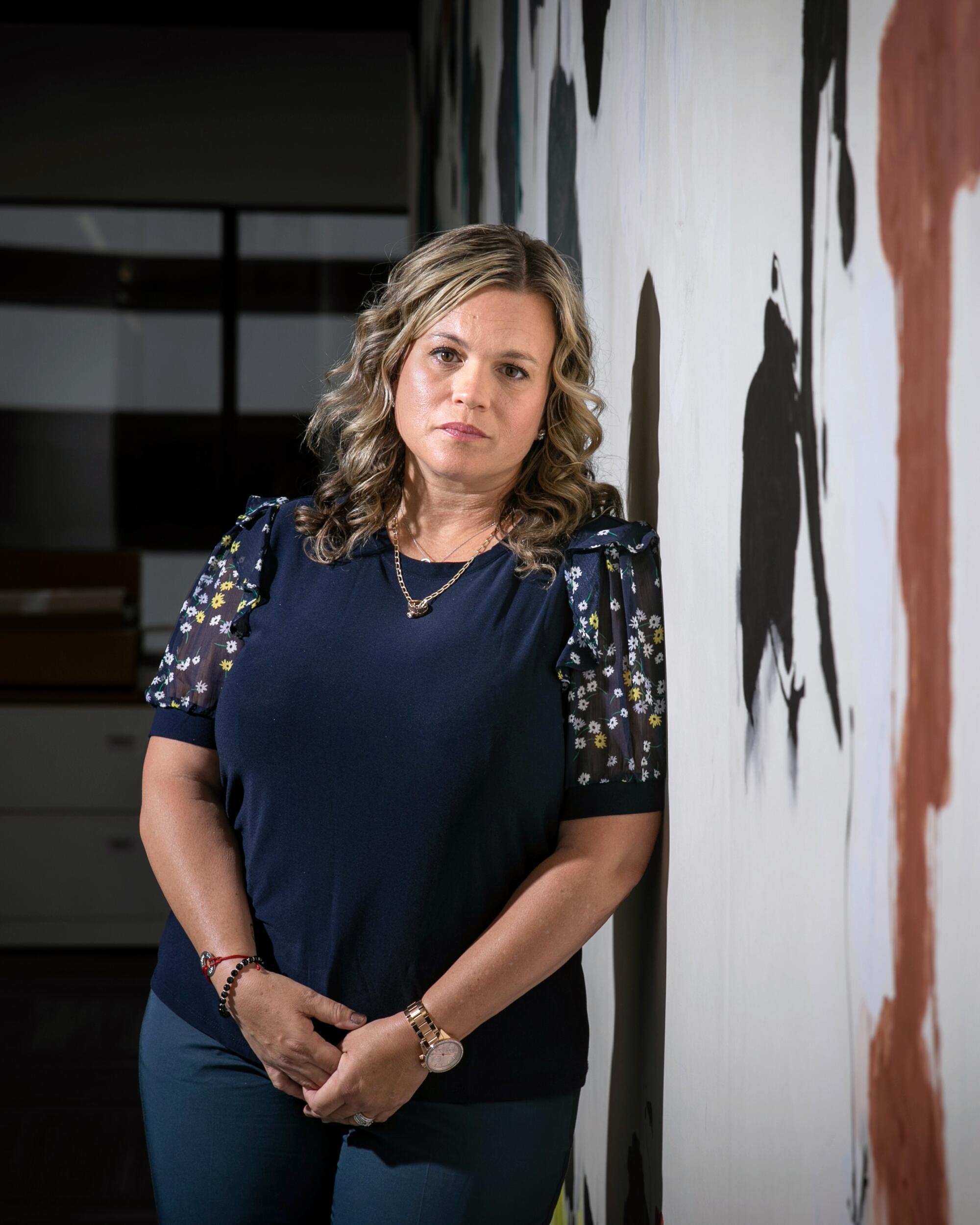
Later, police told Blandin that the detective was actually Austin Lee Edwards, a deputy of the Washington County Sheriff’s Office in Virginia. Edwards, 28, “catfished” the teen girl by claiming to be 17 years old. He became obsessed with her after meeting her online.
He had bound and gagged her parents and put bags over their heads. They probably had died of asphyxiation. Sharie Winek was 65, Mark Winek 69.
Edwards and the 38-year-old Brooke had gotten into a physical altercation. Brooke had tried to fight back, but Edwards overpowered her and slashed her throat with a knife.
Edwards started a fire in a downstairs bedroom with gasoline he brought with him.
The family’s bird and three of their dogs also died in the fire. The fourth dog, which had been left in the backyard during the killings, survived and was placed in an animal shelter.
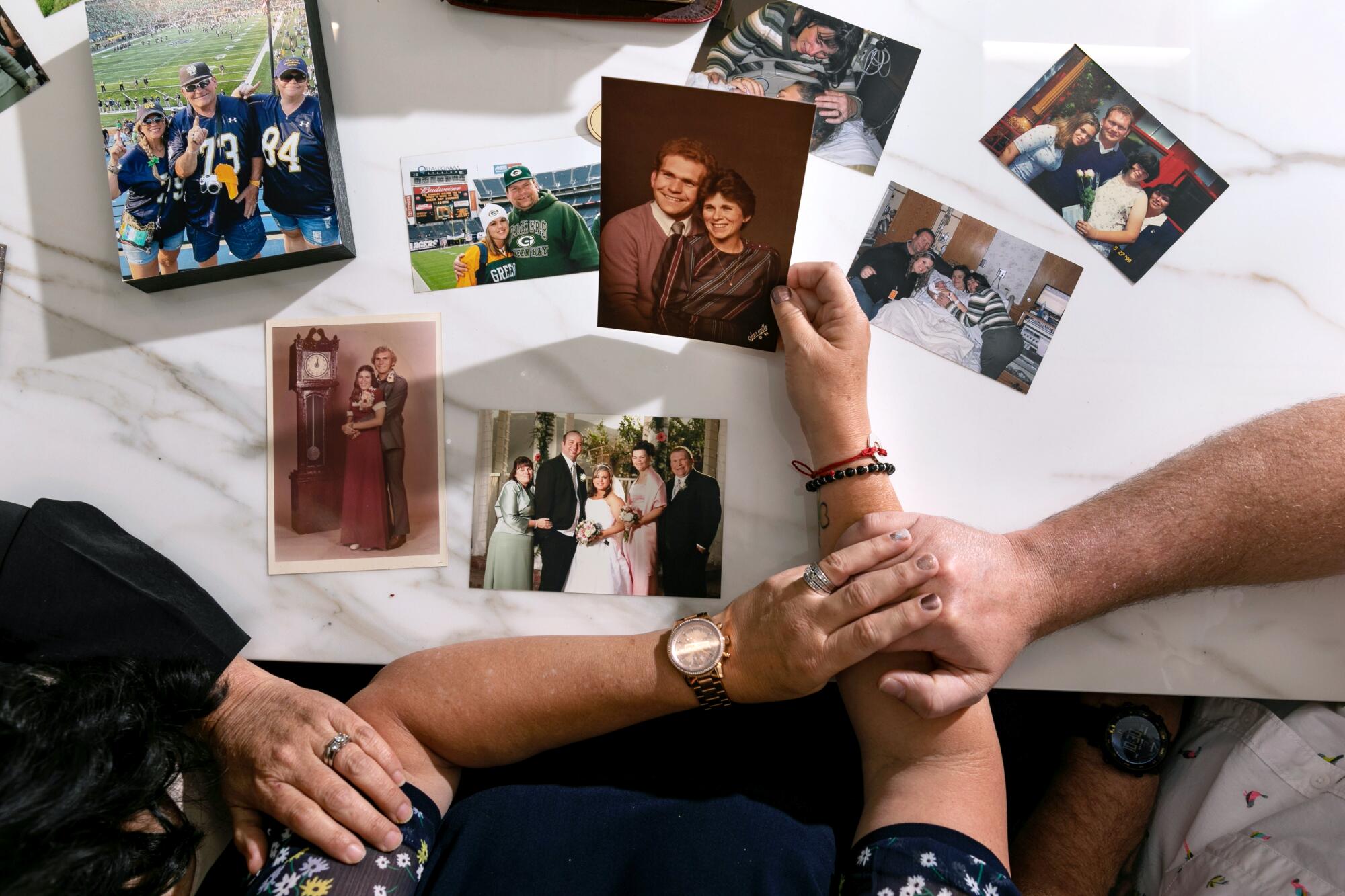
During the slayings, Blandin’s 15-year-old niece had gotten too warm in her mother’s car and wondered what was taking so long. She left her shoes in the car and walked barefoot inside the house. Her grandmother, Sharie, was still moving.
Edwards kidnapped the teen at gunpoint, driving her to the Mojave Desert, about 40 miles from the Nevada border. A SWAT team tried to stop him, but Edwards refused to surrender, shooting at a deputy vehicle multiple times.
He led local deputies on a chase, eventually drifting off the road. Edwards got out of his car and pointed his service weapon at a San Bernardino Sheriff’s Department helicopter above.
The agency first said Edwards was killed in a shootout, later saying that he had shot himself.
In the days and weeks that followed, Edwards’ employers distanced themselves from him.
The Washington County sheriff called him “an evil and wicked person.” Virginia State Police said he didn’t display any red flags. Neither department apologized to Blandin’s family.
Their explanations never satisfied her.
Reporters barraged Blandin and her relatives, wanting more details.
To get the calls to stop, Blandin spoke at a news conference. She highlighted Brooke’s collection of Starbucks cups, Mark’s love of coaching sports and Sharie’s devotion to her grandchildren.
“They lived and loved selflessly,” Blandin said. “And in the words of my favorite New Kids on the Block boy bander, Donnie Wahlberg, ‘spread love and love will spread.’” Wahlberg and his spouse, Jenny McCarthy, later sent the Blandins flowers.
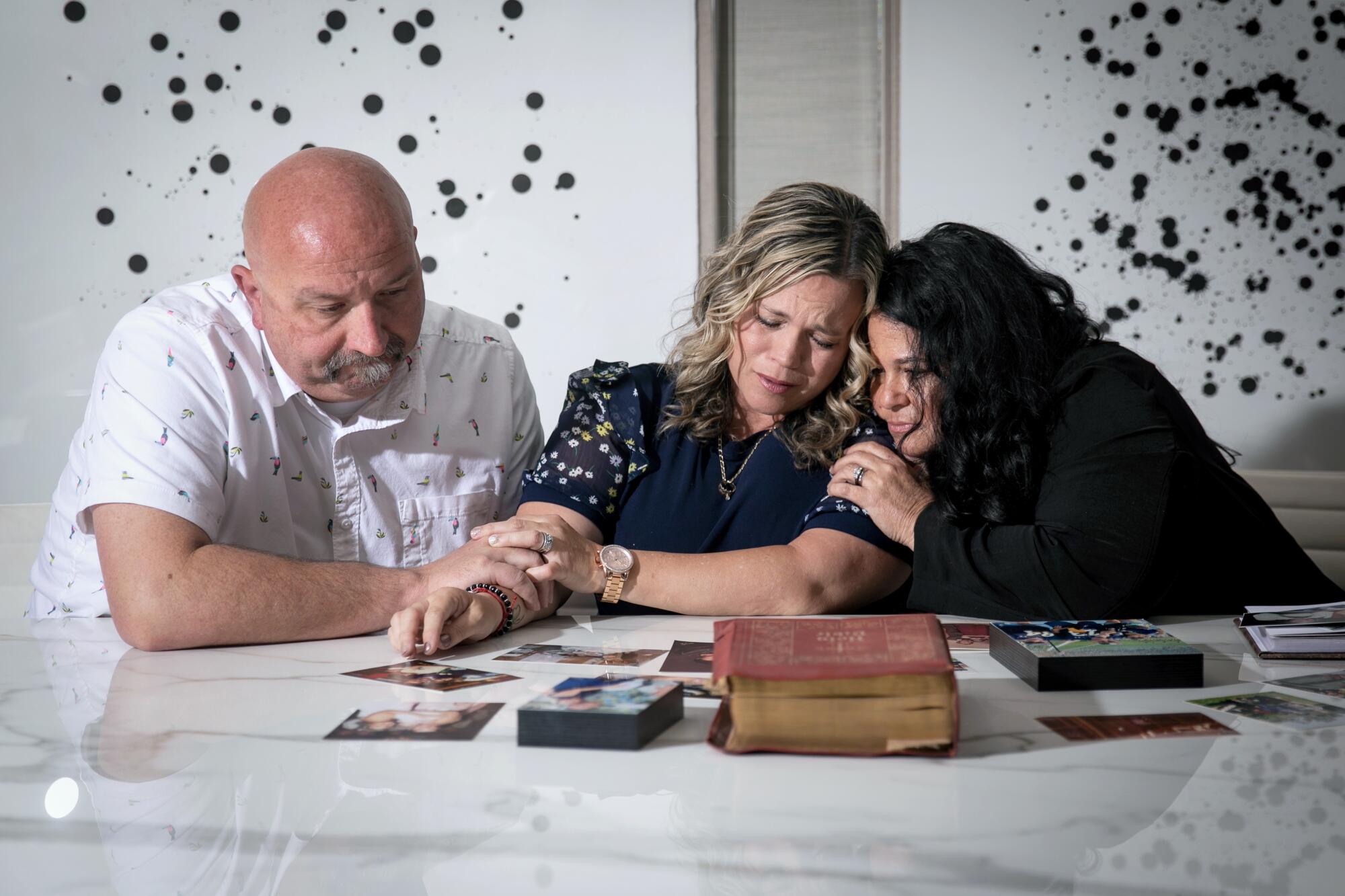
As Blandin grieved and searched for answers, she followed The Times’ reporting about Edwards’ past. In December, The Times uncovered the deputy’s mental health troubles, most notably a 2016 incident in which he was detained for psychiatric evaluation after cutting himself with a knife and threatening to kill his father.
The incident prompted a judge to strip him of his gun rights, which were never restored.
Edwards’ former employer, the Virginia State Police, backtracked, and attributed his hiring to human error. If they knew about his past, they said, he wouldn’t have been hired.
But Edwards had told the state police about the incident, records showed. He also failed his mental health exam, Blandin’s lawyers alleged. The agency had hired him anyway.
Virginia Gov. Glenn Youngkin ordered the state inspector general to investigate. Two weeks later, the Virginia State Police chief wrote a letter that served as the watchdog’s final and only report.
In January, Blandin was angry and devastated by The Times’ reporting that Edwards had solicited nude photos from another minor. He met that girl online in 2014, when she was 13 and he was 20 — nearly seven years before he became a cop.
Blandin and her family have notified Virginia officials of their intent to sue. They say their damages exceed $100 million.
“We want to know why this person was able to get hired not by one but two agencies, and given a firearm when he couldn’t legally buy one,” Blandin told The Times last month. “Where’s your checks and balances?”
As authorities retraced Edwards’ steps, they learned that the day before he killed Mark, Sharie and Brooke Winek, he had spent Thanksgiving in San Diego with his girlfriend.
Edwards told his girlfriend he had run out of vacation time and needed to drive back to Virginia, where he recently purchased a home and blacked out the windows. Instead, he drove to Riverside the morning of Black Friday with a black duffel bag and canisters of gasoline.
When Edwards’ girlfriend hadn’t heard from him for some time, she panicked and reported him missing to police. She had been his girlfriend for five years. They met online.
This article is based on legal documents; written messages; security camera footage; official accounts; and interviews with Mychelle Blandin, her family, her parents’ neighbors on Price Court and her lawyers Alison Polin Saros and David Ring.
More to Read
Sign up for This Evening's Big Stories
Catch up on the day with the 7 biggest L.A. Times stories in your inbox every weekday evening.
You may occasionally receive promotional content from the Los Angeles Times.










